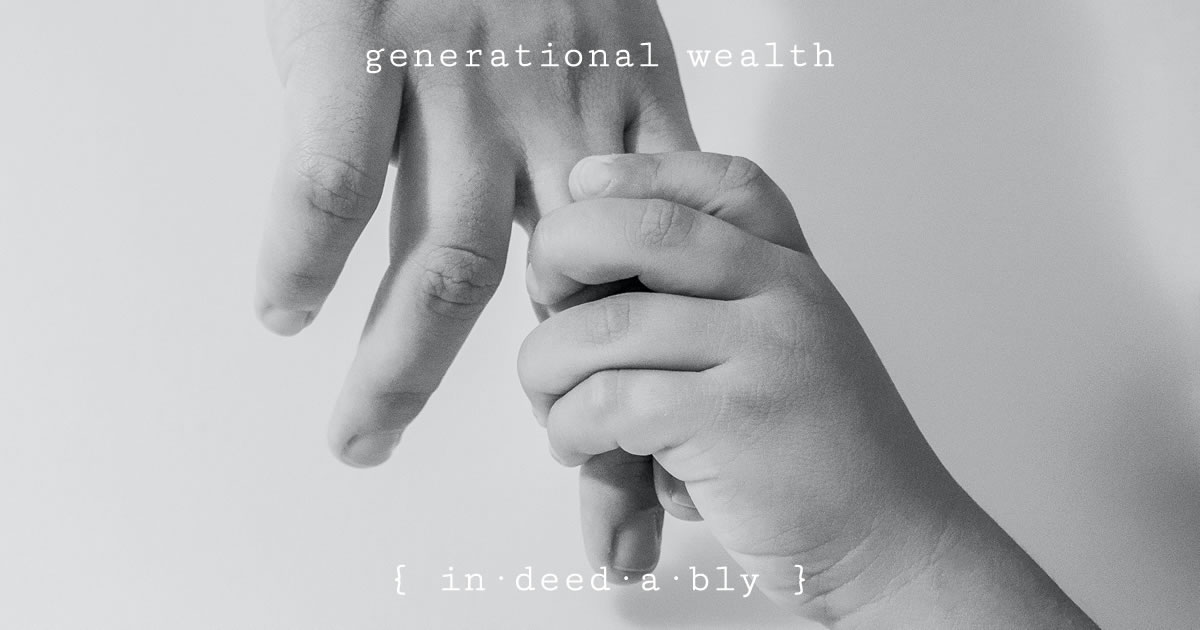Generational wealth.
A phrase that conjures clichés and triggers all manner of knee-jerk reactions.
Inbred aristocracy. Idle nobles, hunting foxes on their manor estates. Old money families flexing their influence to buy elections and sponsor legislation. Legacy students purchasing conferred status from world-class tertiary institutions, regardless of ability. Deploying dynastic trusts and offshore entities to facilitate tax avoidance on an industrial scale.
But here is the thing: wealth, once acquired, confers legitimacy and buys respectability.
Regardless of origin.
Dig deep enough into the folklore of any monied family and tales of skulduggery abound. Today’s oligarchs are little different from the robber barons, raubritter, and monarchs of old.
No better. No worse. Just newer, their dastardly deeds simply performed in recent memory.
What is the origin story of your family’s wealth?
The unvarnished truth. That version only whispered about towards the end of family gatherings like weddings and funerals? As opposed to the oft-repeated fairy tale carefully crafted for the benefit of polite society.
A century ago, I had an ancestor who was said to be a difficult and disagreeable man. Impossible to verify, given he and everyone who crossed paths with him died long ago. Legend has it he was a man faint of praise, free of fist, and prone to pinching pennies so hard they begged for mercy.
As is the case with many of our forefathers, today my ancestor is little more than a name on a tombstone. A stern visage glaring out of an ancient photograph. A ghost in the family tree. In truth notable only for the fact that he reproduced. His lifetime worth of achievements and failures, hopes and dreams, triumphs and tribulations all long forgotten in the mists of time.
All that is, except for one.
A salacious tale was occasionally told about my ancestor. Shared by dementia suffering maiden aunts, from their nursing home beds. Recounted by his grandchildren, grandparents themselves by that stage, when they drunkenly let slip myths and legends of skeletons hiding in the family closet.
The story goes that during the depths of an economic depression there was once a game of cards. Desperate men playing for high stakes in a game they couldn’t afford to lose.
Out of money.
Out of options.
Out of time.
On the final hand, a broke farmer went all in. Betting the title deed to his farm. Good location. Good soil. Good rainfall. The only problem was his seed supply and livestock had all been slaughtered, sold, or stolen. Unable to afford to restock, he gambled everything to try and win a second chance.
Sometimes in life, everything comes down to a single moment. This was one of them.
The broke farmer lost.
A fight broke out. Accusations of cheating. Collusion. Theft. For all I know, they might even be true.
When the dust settled, my ancestor had lost a couple of teeth but gained ownership of the farm.
A farm that provided for his family. The families of his children. And their children. Generational wealth.
The reality is most of us are not born into wealth, whether real, rumoured, or just perceived. Our family names don’t automatically confer minor C-list celebrity status. Electoral pre-selection. Job opportunities. Non-executive directorships. Preferential investment access.
However, the decisions made by our ancestors do determine where we start out in life.
And, reluctant though we may be to admit it, where we start plays a major role in where we finish.
Some of us win the ovarian lottery. Born in a time of peace to families with access to clean drinking water, nutritious food, affordable healthcare, and a warm safe place to sleep.
A few hit the jackpot, choosing parents with the wisdom to recognise the importance of education, the means to provide it, and the foresight to live in a location offering good employment prospects.
Others lose out entirely. Consider the starting point of somebody born to a teenage single mother rape victim. In a refugee camp. Growing up in an orphanage. Raised in a criminal gang or religious cult.
Or perhaps less dramatic, growing up in a deprived rural locale with few prospects and even less hope. Indoctrinated with a closed mind, narrow world view, and an overwhelming fear of the “other”.
Whatever the cause, some folks have a steep climb just to reach the starting line. Many never get there.
As I thought about it, I realised generational wealth is far more prevalent than it may at first appear.
The scale of the numbers and entertainment value of the acquisition stories may vary, but many of us experience the benefit of opportunities passed down from one generation to the next. Parents striving to ensure their children enjoy a life richer in experience and opportunity than the one they had led.
The Bank of Mum and Dad is generational wealth in action.
The elder generation paying it forward to help out their children or grandchildren.
Regardless of whether the transfer is in the form of a loan, gift, or advance on a future inheritance, the main driver for the transaction is family ties rather than commercial sense. Wealth accumulated by one generation passed on to the next.
Parents calling in favours or working their network to secure their offspring university offers, internships, graduate placements, or apprenticeships are another common form of generational wealth.
The transfer of funds may be indirect, but the opportunities afforded to the child will certainly have to be paid for, either for deeds already done or future favours. Opportunities they would never have secured on their own, as they competed in an arms race against other well-connected kids.
The more wealthy or successful the family, the stronger the network. To the “haves” a dream can be a potentially viable opportunity. To the “have nots” it remains the stuff of fairy tales.
A third type of generational wealth is that of education.
Personal Finance writers expound the wonders of compounding and time for good reason. Riches await anyone who begins investing early enough and waits patiently for long enough.
Imagine if your childhood education had included learning about the stock market, real estate, identifying and valuing business opportunities, and the importance of cash flow. Taught by a loved one who had lived the experience, and could provide practical “learning by doing” lessons.
Compare that to the learned behaviours most children pick up by emulating their parents. Credit cards. Gambling. Leased cars. Mortgage stress. Conflating savings, which all too often are really just deferred spending, with investing. Mistaking working hard for working smart, chasing overtime and non-recurring performance bonuses instead of focussing on maximising the marketable value of time.
How might your financial position be different today, had you known how to start investing as soon as you were legally able? Or sooner, if your ancestors had established investment accounts in your name as a child.
Potentially being able to “Coast-FI” from a relatively young age. Possessing the means to make time investment decisions free from the financial imperative. Affording the luxury of choice.
Imagine being able to afford to make career choices based on your interests and values, rather than the harsh commercial realities of real life. Low paying jobs that benefit society and help people would become viable options. Soulless, yet lucrative, finance and technology jobs would lose their lustre.
Compare that invaluable real-world education to the school curriculum. Where children graduate into adulthood knowing how to calculate the volume of a sphere, compose a haiku, and name all the planets in the solar system. Yet they lack the most basic of money management skills, let alone how to invest, minimise taxes, or use leverage.
The attitudes, behaviours, beliefs, knowledge, life skills, and values that grandparents or parents equip the next generation with are the most valuable, yet least discussed, form of generational wealth. Positioning them for success or perpetuating failure.
Much is made of inequality. That some people seem to get all the luck, while others have none at all.
Angst about the playing field not being level. The “haves” winning more often than the “have nots”. That wealth, power, and connections are self-perpetuating engines of opportunity for those with access to them. Hurt feelings that the concept of meritocracy proved to be as real as Santa Claus.
Clichéd responses abound in response to the notion of generational wealth. Mostly ill-conceived attempts at wealth redistribution. Penalising those who had done the work, or had the good fortune to have an ancestor who once did. Rewarding those who had not.
The more I thought out those responses, the more I realised they were unlikely to work. Not sustainably. Human nature and self-interest are irresistible forces of nature. Methods constantly adapting and evolving, but the direction of travel is constant. Never enough, always seeking more.
I couldn’t help but wonder whether a better approach might not be to worry about what we could control? Educate ourselves. Acquire cash flows to create a perpetual money making machine. Pass those lessons on to the next generation. Leave things in a better state than we found them.
Borrow from the approach of countries that established sovereign wealth funds. Turning the proceeds from windfalls today into recurring revenue streams to provide for tomorrow.
The family farm of my ancestors passed down through many generations. Inherited by favoured son after favoured son. Along the way, it paid for many daughters to be married off, and provided seed funding for less favoured sons.
An arrangement that was inequitable, but born of practical reality. Working farms require a certain size to be economically viable, achieving the economies of scale necessary to sustainably support a family through times of both feast and famine. Divide them up, or sell off too many pieces, and kill the goose that laid the golden eggs.
My father did not inherit the farm from his father. But it did pay his way through boarding school, providing an education that allowed him to break with tradition, attend university, and eventually pursue a successful career in a nice air-conditioned office. Which in turn helped him afford my own education, and by extension indirectly that of my children. Generational wealth.
Eventually, all good things come to an end, and generational wealth is no exception. A force from without or a wrecker from within arrives to corrupt the functioning of the perpetual money machine.
Some combination of changing fashion, greed, impatience, incompetence, laziness, technological advancement, or simple bad luck conspire to derail the continuation of that wealth.
The family farm was no different. Its final owner enthusiastically embraced a “die with zero” ethos. The land was divided up and sold off to hobby farmers and homesteaders. The proceeds frittered away on largess and self-indulgence. The last of the farmers rationalised that their obligations to their descendants concluded when their youngest kid came of age.
If their children wanted wealth, they should go out into the world and make it for themselves.
Generational wealth no more.







GentlemansFamilyFinances 4 February 2022
Intergenerational wealth is unfair for those of us who have none (or less) but I feel different towards my own kids – I want to help them as much as possible and it’s not financially helping them it’s in all the ways you describe.
I had a friend in university who was genuinely putting themselves through university; estranged from their bad parents and living in cheap digs, working to earn and learn – it made me feel that I was privledged to always have a home to go home to.
Ironically my mother always spoke of the 3rd generation effect, whereby her grandfather built the wealth, her generation maintained it and the third generation destroy it – that was motivation enough for me to want to price her wrong.
{in·deed·a·bly} 4 February 2022 — Post author
Thanks GFF.
I wonder about the unfair aspect. As I write this I have the Olympics on in the background, the world’s most talented* sportspeople doing their thing for glory, the entertainment of the masses, and a lifelong spot on the motivational speaker circuit should they win a medal.
Substitute wealth for sporting ability in your take: Intergenerational
wealthsporting ability is unfair for those of us who have none (or less) but I feel different towards my own kids – I want to help them as much as possibleWould we still feel the same way?
* subject to opportunity and means to get to the Olympics
GentlemansFamilyFinances 4 February 2022
That’s a bit of a different situation.
Is it fair that Ice hockey players are well paid but field hockey aren’t. Or tennis players vs. table tennis.
However, the Scions of yesterday’s footballing and sports stars gaining the most valuable of all commodities (fame, notoriety and Instagram followers) along with undeserved wealth – that’s unfair
{in·deed·a·bly} 4 February 2022 — Post author
Is it though? Laila Ali or Max Verstappen had no more say in the abilities they inherited, genetic generational wealth, than James Packer or Liz Murdoch did in the wealthy families they were born into. Pure luck of the draw, nothing fair or unfair about it.
GentlemansFamilyFinances 4 February 2022
One involves a lot more effort than the ever though.
And if your success depends on an ancestoral leg-up it means life’s a lot harder for those not so lucky.
{in·deed·a·bly} 4 February 2022 — Post author
True.
That said, without the genetics it would be virtually impossible to win against all those athletes who do possess them. It would be a bit like trying to win the Tour de France without being on performance enhancing drugs when the rest of the field all are.
The premise is flawed behind the presumption that life should be fair, nature just doesn’t work that way!
GentlemansFamilyFinances 4 February 2022
Life isn’t fair but we can design a society
{in·deed·a·bly} 4 February 2022 — Post author
Lol, we did. We get the society (and elected government) we deserve!
GentlemansFamilyFinances 4 February 2022
And monarchy!
steveark 4 February 2022
There is nothing fair about life’s circumstances. I was born to smart middle class college educated debt free eventual millionaires. They were born to poor farmers and to a depression era police family. My kids were born to multimillionaire parents. But it was never money handed down that made a difference. The million I inherited did not move the needle on my wealth. Rather it was the non monetary things we were taught, how to handle money, how to choose a profession we could excel at, how to value education and integrity, how to stay married over the long haul. Those made us wealthy and in turn the millions our kids eventually inherit in their 50’s won’t be life changing, they’ll be insignificant if we did our jobs right in raising them.
{in·deed·a·bly} 4 February 2022 — Post author
Thanks Steveark.
That’s an incredible progression from struggletown to the high life in less than three generations. A credit to you all.
Ironically, that million you inherited that didn’t shift the needle would have made a world of difference to your poor farmer and police ancestors. I share your philosophy that if we’ve done our parenting right inheritances should be insignificant to our children .
Some may argue that inheritances are wasted on the wealthy. There is a counter argument that poor folks who inherit their way to wealth are likely to suffer a similar fate to lottery winners and professional sportspeople/entertainers who suddenly come into wealth and almost as suddenly lose it all. The lack of education and experience making it difficult to sustainably manage and retain it.
Malcolm 4 February 2022
Genetics and good luck
Both inherently unfair but life changing
Genetics are not changeable -yet!- to be born with a good handful of genes is a handout beyond price
Good luck (environmental factors)can be modified by human agency so that equality of opportunity in the face of life’s imponderables is fairer for all
But those genes! What a head-start they give you!
My approach to the kids was to say that those of use give a good start should use it to better society not build palaces for themselves
Got a prison governor,a teacher and a doctor-so perhaps they listened though obviously those sorts of jobs can be abused
Life is not fair but we can soften the blows!
{in·deed·a·bly} 5 February 2022 — Post author
Sage advice for your kids there, Malcolm.
We might not have a say in whether or not we benefit from generational wealth, but what we subsequently choose to do with it is entirely up to us.
dearieme 5 February 2022
“old families last not three oaks.”
{in·deed·a·bly} 5 February 2022 — Post author
I’d take that, dearieme.
“Major Oak” is said to be 800+ years old.
The wisdom of the internet appears to put the average lifespan of an oak between 150 and 300 years, though I have no idea how they would quantify that! By that measure, “old” money is good for 450-900 years.
Smart bloke that Thomas Browne.
Bob 5 February 2022
I feel reassured by some of the comments about the value of practical financial education generations can provide. As a slum kid my parents and grandparents could never have guided me towards a better living. At the time there was no careers guidance. Whatever new student teacher arrived got that portfolio along with RE. They were quick to ditch it to the next rookie.
So, knowing what I do now, I applaud some of the commentators above.
{in·deed·a·bly} 5 February 2022 — Post author
Thanks Bob. Sounds like a tough gig being the new student teacher, a thankless task!
If my elder son’s recent experiences are anything to go by, career guidance is still underwhelming in schools. Guest speakers all from low earning vocations. Children discouraged from dreaming big or shooting for the stars, guided instead towards unambitious careers that run no risk of showing up the earning potential of a state high school teacher. In many respects it is the blind leading the blind, the teachers understandably unfamiliar with the worlds of technology, engineering, or high finance and therefore both uncomfortable and unqualified to opine upon them.
Ward Just 5 February 2022
What an interesting topic!
You ask yourself, wow, were all of our ancestors total dummies? If each generation would pay forward, then we all would be in a better place, no? Okay, a few world wars, sickness, famines, risks not rewarded, faulty business plans, etc. can wreak havoc. Now we have climate changes to contend with, goodness!
The money ain’t gone, it’s just changed hands!
Having a net to catch you (generational money) can impede you from finding what really slumbers in you. And, it’s a really exciting challenge. Not always fun though!
Achievement is always sweetest when you have done it yourself (being honest about it though). We all get help somewhere. It’s a pride no one can take from you (the money yes, the achievement no). Keeping a business alive long-term is tough. New business models, transformation processes, breaking from norms, etc. See changes in S&P500 top companies over the years.
It is massively important to have family, mentors, friends of friends, etc. help you to get that first door open when you are starting out. A loving home, higher education, making good luck, less wrong decisions early on. You’re right, not fair.
Try not to be a waiter when you grow up. That is, waiting for someone to die! It poisons the brain.
Would have been nice though to have that house paid for upfront (through a fat inheritance). And with the cool kitchen from the design magazine!
Why fight for everything? The frugality, the self-convincing, the questioning whether that whatever is needed, setting the example, planning for tomorrow, rejecting the Corvette for the Corolla, the I don’t need that to be happy statements…
We want the hand up, to be shown the way, told where we need to look. It is a dangerous course, dad’s paper mill, the car plant with the union job for life. Their success may not be ours.
Wish it was all linear, but luck and agency play a big role even when all is explained and planned out. Trying to grow that goose, keeping it safe, treating it correctly, doing the best I can, being frugal, don’t exceed 4% (today 3%), fuckin’ hell. See you at the pub!
{in·deed·a·bly} 5 February 2022 — Post author
Fantastic comment Ward Just, thank you. You should write a blog of your own!
Dummies? Not all of them, no. Just most. Lacking ambition, just as true of us as it was of them. Horizons too immediate. Timescales too short. Goal posts too close.
Truth is the trivia we waste so much time worrying about every day is just as irrelevant as whatever our ancestors a hundred years ago worried about. Nothing that will be remembered several years hence. Which is disheartening at first blush, then very liberating.
Undoubtedly. Though as you observed, luck and agency mean the snakes and ladders game of life will see the winners and losers evolve over time. Money changing hands, rarely disappearing entirely.
True. But pride and dining out on achievements past won’t keep us warm and fed. On balance, I’d rather have a portfolio throwing off free cashflows. Nobody else cares how great we remember ourselves having once been, we probably should think about it less also.
For mine, given average lifespans, inheritances should skip a generation. Steveark is right that if our kids haven’t secured their own futures by their 50s/60s when they might expect to receive an inheritance, they’ve stuffed it up. By that stage, an inheritance should be irrelevant. Instead, leave it to the grandkids (or great-grandkids) where it may actually make a difference. Those who still have mortgage challenges, student debts, and childcare fees in front of them.
I wonder how much of this is rationalisation? Our attempts to make our peace with the fact that we have enough for anything, but not everything? If maney weren’t scarce, nobody would trot out these kinds of self-justifying statements. Telling ourselves what we want to hear. That contentment is found in recognising “enough“, gratitude for what we have rather than longing for what we don’t. No judgement here, just self-awareness (I do it too).
But isn’t that education in a nutshell? Be it from a coach, mentor, parent, or teacher? Learn from the mistakes of others, so we don’t need to repeat them all ourselves. Liberating us mess things up in our own new and unique special ways, rather than reinventing the wheel.
Very true. But equally, their failure need not be ours either.
The thing is, it isn’t all that different from what most of us try to do today.
Contribute to a pension while working, so the pension will contribute to our living costs once we are not.
Pay off the mortgage while we are young, so that we don’t have to worry about housing costs when we are old, and our post-retirement income has fallen off a cliff.
The only real difference is where we draw the finishing line.
An annuity is a bet the house (almost) always wins, obligations ceasing at end of life. Those perpetual cash flows I wrote about continue from beyond the grave, much like my ancestor’s farm. Helping out the next generation. But only if they don’t cash them in to pay for that designer kitchen!
That’s where these philosophical conversations belong!
Investimouse 5 February 2022
A nice piece of writing describing privilege. You might enjoy the cartoon here: https://www.rnz.co.nz/news/the-wireless/373065/the-pencilsword-on-a-plate
{in·deed·a·bly} 5 February 2022 — Post author
Thanks Investimouse. The authors behind that cartoon did a good job illustrating their concept.
I must confess I try to steer clear of any conversation involving the word privilege. It seems to get used as an accusation at times, seeking to diminish or undermine the achievements of others. Indeed, leading some people to feel obliged to apologise for something they had no say in, such as their genes or their childhood socioeconomic status.
There is a cliché that just because somebody started in front, they are an entitled asshole. Certainly some are, but I think this is a personal choice rather than an automatic outcome.
To my simple mind, we should each be self-aware enough to recognise everyone has a different starting point and a unique backstory. From there the question is what we individually did with the opportunities presented to us, and how did we improve our own lot in life.
A rich person getting richer is no less of a commendable achievement than a person born in a slum finishing in the suburbs. Both are steps forward, if progress was measured solely by money.
Equally, an entitled person pissing away their advantages is no worse than someone who failed to seize what opportunities did come their way. Both squandered their future, the problem lay within rather than without. Nothing to be gained by blaming the “other“.
I think if we are able to provide our kids with a comfortable upbringing and more opportunities than we enjoyed, then we should consider ourselves to be winning at life. Being a billionaire would be nice, but having “enough” is good enough.
Impersonal Finances 7 February 2022
Love the ovarian lottery term, as Warren Buffet has talked about several times. It’s nothing but pure luck. The more people normalize talking about money, and doing so without shame, the better chance we all have. At least that’s my thought about finance blogging to a small audience such as I do haha.
Very interesting topic per usual!
{in·deed·a·bly} 7 February 2022 — Post author
Thanks Impersonal Finances. Luck and random chance certainly places a bigger part in life than most of our egos would be comfortable to admit.
What is fascinating is how perspective plays a part also.
To the child, the ovarian lottery is all about luck. Nothing they could have done to influence the outcome. Accept it, make our peace with it, and move on.
To the parent, that same outcome is driven largely by choices. Who did they have children with? Where did they choose to live? What profession do they choose to work in?
Many would argue they don’t get much of a say in those things. The millions of migrants constantly leaving all they knew behind in search of a better life for themselves and their children may say different.
So too the participants in the almost 50% of marriages that fail, deciding for one reason or another that the status quo is not good enough and seeking out more/better/different for themselves and their children.
It all comes down to what we’re willing to settle for, versus what we are willing to risk on the chance of something better. The smart money is content with enough. The dreamers will never be satisfied, always yearning for more.
Somewhere amongst all that struggle and uncertainty, children are born and raised and educated. Adapting. Evolving. Learning. Surviving. Before long repeating that same cycle.
David Andrews 7 February 2022
Some financial education and a little bit of “seed capital” can bear significant fruit.
My son is almost 8 and he knows he’s invested in the stock market and the reasons why. He knows that saving is good but we also need to make sure we spend some money on fun activities – otherwise what’s the point.
His future self will forgive some funds invested in pick and mix sweets now rather than Vanguard.
Like many, I largely learned financial skills myself and rather wished I’d had a financial mentor earlier in life.
Perhaps that would have encouraged me to get into housing and investments earlier but it could also have meant a larger exposure to those market “corrections” we keep having.
In the future it’s likely I will inherit some significant, but not life changing funds, but they don’t represent a necessity in my financial plans. The funds/ property will likely be passed to my son early enough in life to make a difference. I’m hoping to give him the choice to do anything but not everything and definitely not nothing.
{in·deed·a·bly} 7 February 2022 — Post author
Thanks David.
Sounds like a well thought through plan for your little bloke, I hope he makes a success of it.